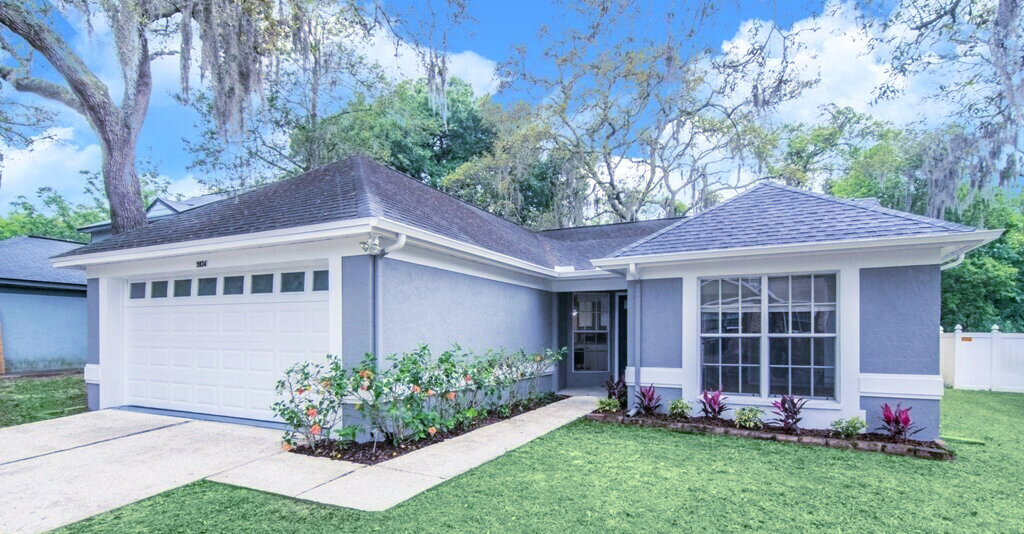Overview Of Closing Costs In Florida
When selling a house in Florida, understanding closing costs is essential. Closing costs are typically the fees associated with the completion of a real estate transaction.
In the state of Florida, these expenses are usually split between the buyer and seller. Common closing costs include title search fees, document preparation fees, property taxes, and appraisal fees.
Buyers in Florida typically pay for the title insurance policy, survey expenses, and documentary stamps, whereas sellers may be responsible for covering loan payoff amounts, transfer taxes, and other settlement charges. It is important to factor in all potential closing costs when determining an asking price for your home or budgeting for your purchase.
Working with a qualified real estate professional can help you navigate through all necessary financial considerations when buying or selling a home in Florida.
Table Of Contents
1. Overview Of Closing Costs In Florida
2. What Is Included In Closing Cost For Buying A House In Florida?
3. How Much Are Closing Costs In Florida?
4. Is It Better To Ask For Closing Costs Or Lower Prices In Florida?
5. Does The Buyer Or Seller Pay Transfer Tax In Florida?
6. How To Calculate Closing Costs In Florida?
7. What Are Other Expenses Involved During The Home Purchase Process In Florida?
8. What Is The Buyer Responsible For At Closing In Florida?
What Is Included In Closing Cost For Buying A House In Florida?

Closing costs when buying a house in Florida can vary significantly depending on the type of property, location, and other variables. Generally, the most common closing costs include property taxes, title insurance fees, recording fees, appraisal fees, survey fees, lender’s origination fee (if applicable), and prepaid items like homeowner’s association dues or homeowners insurance.
Property taxes are based on the assessed value of the home and will be due at closing; this can be paid in full or split between buyer and seller, depending on the agreement. The lender’s origination fee is generally paid by the borrower to cover administrative costs associated with obtaining a mortgage loan; however, some lenders may offer to waive this fee as an incentive for borrowers.
Title insurance is necessary to protect the buyer’s interest in the property and covers any potential legal issues like liens or claims that were not disclosed prior to closing. Recording fees are also required for any documents that must be filed with local government offices, such as deeds or mortgages; these documents may vary from county to county, so it is important for buyers to check their local requirements before signing any paperwork.
Lastly, appraisal fees cover the cost of having a licensed appraiser evaluate the property and provide an estimate of its fair market value so that all parties involved can make informed decisions about pricing.
Who Pays For Closing Costs In Florida?
When selling a house in Florida, it’s important to understand who is responsible for closing costs. In Florida, buyers and sellers typically split the closing costs on a home sale.
The buyer will typically pay for their title insurance, taxes, recording fees, and other associated charges while the seller pays for the owner’s title policy, transfer taxes, documentary stamps on mortgage documents, survey fees, and any HOA or condo association fees. Depending on local real estate markets or the terms of the sales agreement between buyer and seller, either party may be responsible for certain closing costs that are traditionally paid by one side or the other.
It is important to know ahead of time who will be responsible for each cost so there are no surprises at the closing table.
How Much Are Closing Costs In Florida?

Closing costs in Florida can vary greatly depending on a variety of factors, including the size and location of the house, who is involved in the transaction, what services are used, and more.
Generally speaking, closing costs are typically between 2-5% of the total sale price of the house.
The majority of these costs will go to paying for title insurance, realtor fees, document preparation fees, escrow fees, transfer taxes or stamp taxes from the state and local government, and other related expenses.
It’s important to remember that although closing costs may seem like an extra expense at first glance, they are typically split between both buyer and seller so it’s important to understand exactly how much each party will be responsible for before agreeing to any terms.
What Are The Different Types Of Closing Costs For Buyers And Sellers In Florida?
When selling a house in Florida, buyers and sellers should understand the different types of closing costs that may be applicable to them. Buyers will typically pay for title insurance, prepaid interest, an appraisal fee, a survey fee, and taxes.
Sellers may have to pay for a real estate commission, transfer taxes, and documentary stamps. Additionally, both parties may need to cover various other fees, such as attorney fees, homeowner association fees, or prorated property tax payments depending on the agreement between buyer and seller.
It is important to ensure all closing costs are accounted for when negotiating the final sale price of a home in Florida.
Is It Better To Ask For Closing Costs Or Lower Prices In Florida?

When selling a house in Florida, it can be difficult to decide whether it is better to ask for closing costs or lower prices. Asking for closing costs may result in a higher overall sale price, but it allows the seller to keep more of the money from the sale.
On the other hand, lowering the price can make it easier to attract buyers and does not require any additional funds from them. It is important to consider all factors when determining which option is best for your specific situation.
For instance, if there are already many houses on the market in your area, lowering the price could be beneficial because it will make your home stand out compared to similar properties. However, if you have an investment property with few comparable listings nearby, asking for closing costs might be preferable since you may not need to reduce the price as much.
Additionally, if you are looking for a quick sale and have some flexibility on the final sale price, offering closing costs may be appealing since many buyers view this as an incentive when deciding where to purchase. Ultimately, understanding how these different approaches impact your particular situation is crucial for making an informed decision about how best to approach selling your house in Florida.
Can Closing Costs Be Rolled Into The Mortgage When Buying A Home In Florida?
When buying a home in Florida, closing costs typically cannot be rolled into the mortgage. Closing costs are fees associated with the purchase of the home and include title search fees, attorney’s fees, inspection fees, and transfer taxes.
Generally, these costs must be paid upfront or included in the loan as part of the down payment. Buyers should understand that closing costs can range from two to five percent of the total purchase price and should budget accordingly when purchasing a home in Florida.
Sellers may also have closing costs such as broker commissions, deed recording fees, and title insurance premiums, which will need to be taken into consideration when understanding who pays the closing costs when selling a house in Florida.
Does The Buyer Or Seller Pay Transfer Tax In Florida?

When selling a house in Florida, transfer tax is one of the closing costs that must be considered. Transfer taxes are typically paid by the buyers. However, some counties and cities may require the seller to pay. The amount of transfer tax varies depending on where the property is located. For example, in Miami-Dade County, there is a $70 per $100 value or portion thereof assessment, while Hillsborough County has a flat fee of $750 for all residential properties regardless of sale price.
It is important to understand who pays the transfer tax when selling a house in Florida, as it can have an impact on your budget and bottom line. Before entering into any real estate transaction, it is recommended that you find out who will be responsible for paying the transfer tax and how much it will cost.
Who Pays Closing Costs On New Construction In Florida?
When selling new construction in Florida, the buyer and seller are responsible for different closing costs. Generally, the buyer pays for most of the costs associated with closing, such as title insurance, transfer taxes, recording fees, inspection fees, and attorney fees.
On the other hand, the seller typically pays for any commissions owed to their real estate agent as well as prepaid items like taxes and insurance. Depending on local laws and customs in Florida, both parties may share responsibility for some of these costs.
It’s important to understand who is responsible for what when selling a house in Florida so that buyers and sellers can budget appropriately and avoid any misunderstandings or surprises at the closing table.
How To Calculate Closing Costs In Florida?

When selling a house in Florida, it is important to understand the closing costs associated with the transaction. Closing costs vary depending on the type of loan and other various factors, so it is essential to do your research and calculate these fees prior to signing any documents.
The buyer typically pays for certain closing costs, such as title insurance and recording fees, while the seller pays for other costs, including real estate commissions and transfer taxes. To calculate closing costs in Florida, the seller should contact their local county appraiser’s office to find out what transfer taxes may apply.
Additionally, they should factor in real estate commission rates as well as title insurance premiums and escrow fees. Understanding all of these costs is key when selling a house in Florida since they can add up quickly.
It is important to be aware of these fees before entering into a transaction so that you can make an informed decision about how much money you will need to complete the sale.
Strategies To Minimize Closing Costs When Buying A Home In Florida
When buying a home in Florida, understanding closing costs and who pays them is essential. To minimize closing costs, buyers should compare different lenders to find the best rates and fees.
Researching the current real estate market can also be helpful in obtaining lower fees. Additionally, using a real estate attorney to help negotiate the contract between buyer and seller can be beneficial since they are familiar with local laws and regulations related to closing costs.
The buyer should also ask for an itemized list of all associated fees before signing any documents. Finally, if the buyer has saved up enough money, it may be possible to pay for some of the closing costs upfront or ask the seller to cover them as part of the negotiation process.
By understanding these strategies and taking advantage of them when possible, buyers can save a significant amount on their closing costs when purchasing a home in Florida.
What Are Other Expenses Involved During The Home Purchase Process In Florida?
When selling a home in Florida, it is important to understand the closing costs associated with the transaction. In addition to the closing costs, there are other expenses involved during the home purchase process.
These additional expenses may include title fees, transfer taxes, recording fees, and homeowner’s insurance. Title fees cover costs associated with researching the property title to make sure that there are no liens or judgments attached.
Transfer taxes are imposed by local governments and must be paid before the buyer can take possession of the property. Recording fees cover administrative costs associated with filing paperwork related to the sale of the property.
Homeowner’s insurance is often required by lenders and provides coverage in case of damage to the house or personal belongings inside. It is essential for buyers and sellers alike to be aware of all expenses related to a home purchase in Florida in order to ensure a smooth transaction.
Finding The Right Real Estate Agent For Your Home Purchase In Florida
When searching for a real estate agent to assist you with your home purchase in Florida, it is important to understand the closing costs associated with selling a house in the state. These costs can be significant and can vary depending on the type of property being sold.
A good real estate agent will help you understand what these closing costs are, who pays them, and how they are calculated. They should also know current market trends and pricing in the area so that you can make sure you get the best deal possible when buying your home.
Additionally, they should be able to provide helpful advice about potential financing options and other tips for buying a house in Florida. Taking the time to find an experienced real estate agent who understands closing costs when selling a house in Florida can help ensure that you get a great deal on your dream home.
Understanding Pre-paid And Escrow Accounts In A Home Purchase Transaction In Florida
When purchasing a home in Florida, it is important to understand the basics of pre-paid and escrow accounts. Pre-paid are funds that are paid upfront for items such as taxes, homeowners insurance, and interest.
These amounts are then accounted for throughout the year. An escrow account is an account held by a third party on behalf of both parties in a transaction.
The buyer has the responsibility of depositing monies into an escrow account before closing to cover any expected expenses related to the purchase of the home. This money can be used for items such as inspection fees, appraisal fees, and title fees.
When selling a house in Florida, it is important to understand how these two components will affect your closing costs and who will be responsible for them. Pre-paid may be credited back to the seller at closing, while escrow accounts may require payment from either the buyer or seller, depending on the terms of the contract.
Understanding how these payments will be handled can help you plan accordingly when preparing to sell your house in Florida.
Exploring Title Insurance Options When Buying A Home In Florida
When buying a home in Florida, one of the most important aspects to consider is title insurance. Title insurance protects a homeowner from any potential legal disputes regarding the ownership of their home.
This type of insurance is often required by lenders, so it’s important for buyers to understand what they are getting when they purchase title insurance. It will also help them understand the closing costs associated with selling a house in Florida and who will be responsible for paying those costs.
Title insurance can cover things such as liens, encumbrances, or any other claims against the property, ensuring that all legal matters related to ownership have been addressed before closing on the sale. Additionally, it is important for buyers to review their policy so they can better understand the coverage they are receiving and if there are any additional fees or expenses that need to be taken into consideration.
Do Sellers Have To Pay Closing Costs in Florida?
Yes, sellers typically have to pay closing costs when selling a house in Florida. Common closing costs for the seller include transfer taxes, title insurance for the buyer, and documentary stamps on the deed.
The seller may also have to pay an attorney’s fee, real estate commission, and other administrative fees associated with the sale. All of these are typically defined in the purchase agreement.
In some cases, such as if the buyer is obtaining financing from a lender, the seller may be required to contribute to certain closing costs such as loan origination or discount points and pre-paid interest. Ultimately, it depends on the specifics of each individual sale and should be thoroughly discussed between all parties involved before signing any contract.
What Is The Buyer Responsible For At Closing In Florida?
The buyer is responsible for a variety of closing costs when selling a house in Florida. These fees can include title fees, recording fees, transfer taxes, survey fees, and home inspection costs.
It’s important to understand that the buyer will be responsible for paying these closing costs at the time of settlement. Additionally, they may need to pay attorney’s fees if they are using an attorney for the transaction.
The amount of these closing costs varies based on the county and type of property being sold. It is important for buyers to research what they are expected to pay before entering into a contract with a seller.
Knowing ahead of time what to expect can help alleviate some stress during the closing process and ensure all parties involved understand their responsibilities at closing.
Who Pays Closing Attorney Fees In Florida?
When selling a house in Florida, it is important to understand who pays the closing attorney fees. In most cases, the seller will be responsible for paying the closing attorney fees.
The buyer’s closing costs may also include some of the legal fees associated with the sale. However, certain situations can arise where the buyer agrees to pay part or all of those fees, depending on what is negotiated during escrow.
It is wise for both parties to consult with their own real estate attorney and discuss any questions they have surrounding who pays closing attorney fees prior to agreeing. Buyers should also keep in mind that some of these fees may be tax deductible if they meet certain criteria outlined by the IRS.
How Much Are Closing Costs On A $300,000 House In Florida?
Closing costs on a $300,000 house in Florida vary depending on the specifics of the sale. Generally, sellers are responsible for paying some or all of the closing costs when selling a house in Florida. These costs can include title insurance, transfer taxes, document preparation fees, attorney’s fees and more. Title insurance is typically the largest expense associated with closing costs and can range anywhere from
5% to 1% of the total sales price. Transfer taxes are also common in many states and counties and can be as much as 2%. Document preparation fees can range from $150 to $650, while attorney’s fees will depend on how complex the transaction is. Homeowners should consult with their real estate agent for an estimate of what their total closing costs may be when selling a house in Florida.
| REAL ESTATE BROKER | REAL ESTATE AGENTS | REALTORS | BANKRATE.COM | BANKRATE | TITLE COMPANY |
| CASH | HOME INSURANCE | INFORMATION | EQUITY | STAKE | THE UNITED STATES |
| U.S. | AMERICA | PROPERTY APPRAISAL | MEDIAN HOME PRICE | LAWYER | COMPANY |
| BANK | BANKING | PRO-RATED | HOMEBUYERS | MIAMI, FL | HOME INSPECTIONS |
| FHA LOAN | FHA | CREDIT REPORT | CREDIT HISTORY | CALCULATOR | PREPAYMENT PENALTIES |
| PERCENTAGE | CONSUMERS | ZIP CODE | UNDERWRITING | TECHNOLOGY | TAMPA |
| SARASOTA | HOUSING MARKET | PROFIT | OUT OF POCKET | OUT-OF-POCKET | NEWSLETTER |
| INSURANCE POLICIES | INCENTIVES | FINANCES | CREDIT SCORE | BLOG | ARREARS |
| IN FLORIDA IS | IN FLORIDA THE | FLORIDA REAL ESTATE | THE REAL ESTATE | THE PURCHASE PRICE | BUYER AND THE |
| AND THE SELLER | THE PROPERTY THE | ON THE PROPERTY | CLOSING COSTS CLOSING | OF REAL ESTATE | LOAN ORIGINATION FEES |
| THE SELLER AND | IN FLORIDA ARE | TO PURCHASE THE | CLOSING COSTS TO | SELLER CLOSING COSTS | COSTS IN FLORIDA THE |
| WHAT ARE CLOSING COSTS | PROBLEMS WITH THE PROPERTY | IN FLORIDA CLOSING COSTS | OF THE PURCHASE PRICE | THE CLOSING COSTS FOR | CLOSING COSTS FOR SELLERS |
| THE BUYER AND THE | BUYER AND THE SELLER | PRICE OF THE HOME | BOTH THE BUYER AND |

